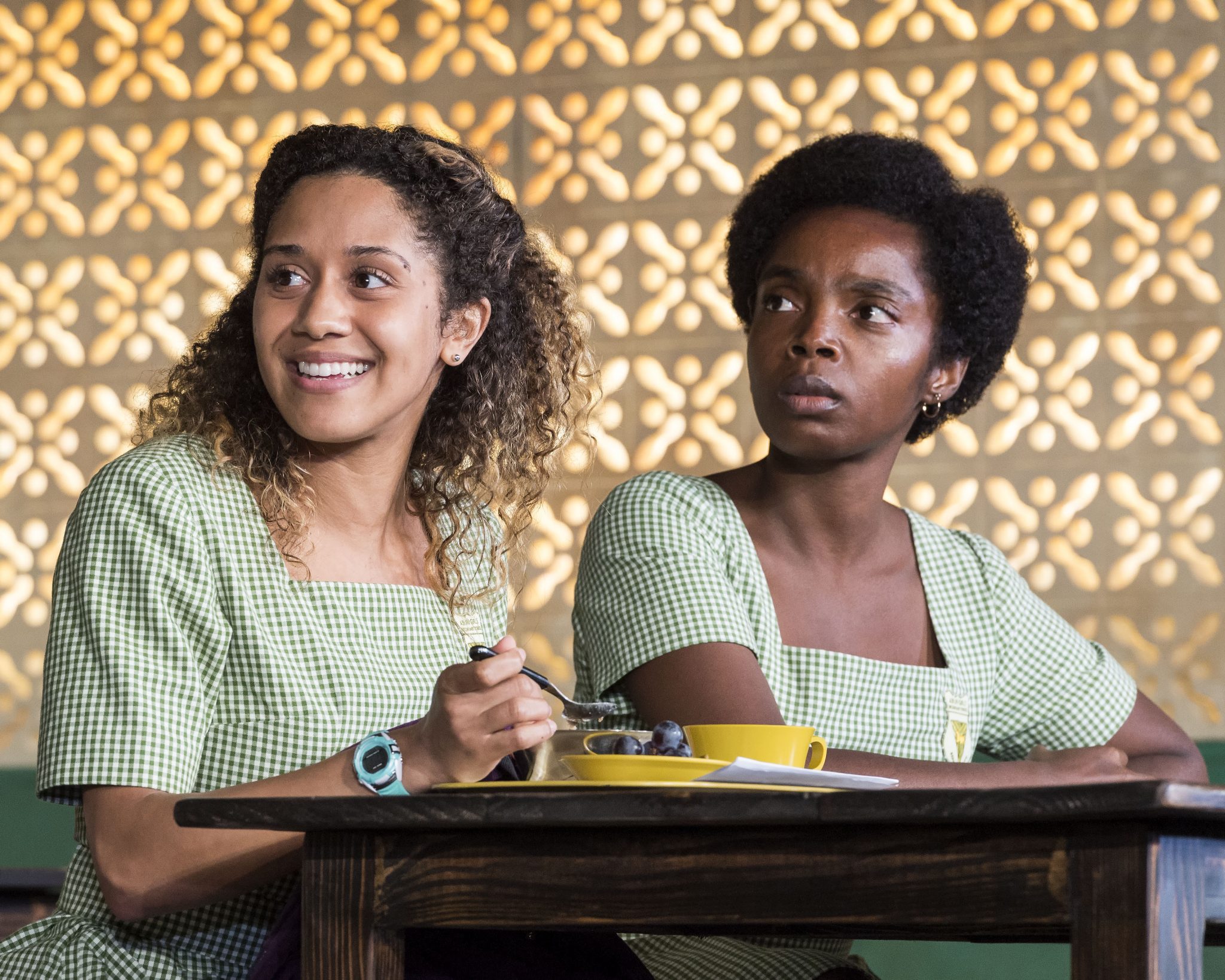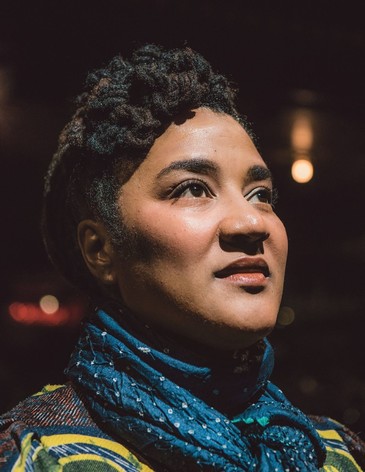

Reviews
Fabulation or, The Re-Education of Undine by Lynn Nottage — Review
Published
7 years agoon
By
Marcus ScottAfro-American narratives are experiencing a meteoric surge in the proliferation of the modern mainstream liberal white consciousness in the nation, critics will say, and they aren’t wrong. When All Arts circulated playwright Donja R. Love’s “List of Black Theater in New York City,” an alphabetized inventory of some of the most anticipated or under-the-radar stage shows by black storytellers and griots initially published on his Facebook page, the effect was cataclysmic, inspiring similar lists by other underserved and undervalued communities alike. But most exhilarating was the writer’s additional note that 31 of the 55 new works of the 2018-2019 theatre season are by black women and black femmes, which is unprecedented, considering especially how white, homogenized and segregated contemporary theatre is in The Capital of the World.
Enter Lynn Nottage’s 2004 satirical riches-to-rags comedy “Fabulation or, The Re-Education of Undine,” directed by Lileana Blain-Cruz, which receives a long overdue remounting within the Romulus Linney Courtyard Theatre at the Pershing Square Signature Center, kicking off a three-play residency for the storyteller at the acclaimed off-Broadway theater. Nottage, the first and only woman to take home the Pulitzer Prize for Drama twice—the first in 2009 for “Ruined,” and the second in 2017 for “Sweat,” both naturalistic tragedies—delivers a, dare I say, family-friendly romp filled to the brim with subtle updated observations on upward mobility and respectability politics that should come with more fanfare than it is unlikely to obtain from theatergoers or middle-of-the-road critics. That’s because often, many of the shows produced for commercial run seem tailored to the white gaze, with a particular caliber of plays being penned with the predilection for black suffering. However, “Fabulation,” a love-note to Nottage’s grandmother and whose target audience is Black women, in particular, creates a joyous farce that mocks both the upper elite and poverty porn with bombast.
The show depicts 37-year-old Undine Barnes Call-es (Cherise Boothe), a high octane black female business executive and head of her own Manhattan boutique publishing firm who seems to be in control, making moves from her high-rise office. Until she discovers, while trying to book a celebrity for the Fallopian Blockage ball, that Hervé, her Argentine husband has embezzled all of her savings and absconded. Body-slammed by a blitz of bad luck, a visit by an FBI agent signals that she’s also being investigated for identity fraud, stating she seems “to have materialized from the ether.” Which, as we find out, is correct: Undine’s real identity is Sharona Watkins, who grew up a Brooklyn public housing project, the product of working-class security guards. Yikes!
Her fall from grace and the public eye are similar to the Book of Job: While Undine is far from a good person (she carelessly expunged her family in a magazine profile, falsely claiming they perished in a fire), her financial ruin causes public shame, forcing her to file for bankruptcy and to return to her parents in Fort Greene. In addition, her security guard brother Flow, a cypher-spitting Iraq war veteran, mocks her when he’s not rhyming about Br’er Rabbit and Uncle Remus; long-lost friends from childhood know nothing of her Dartmouth education or achievements; and she’s sharing sleep quarters with her heroin-addicted grandmother. To make matters worse, during a routine check-up after suffering a severe anxiety attack, Undine’s discovers she’s pregnant and left to wait in the purgatory of a Social Services office with a self-righteous over-the-counter clerk to get welfare. But the cherry on top? After reluctantly agreeing to buy drugs for Grandma, Undine gets arrested and is ordered to join a drug counseling group. A bit of a ham, Undine engineers a tale of deception, fabricating a life of addiction that began with Percocet. There, she meets an optimistic ex-con and recovering addict who admits that just three years prior he was “that brother you cross the street to avoid,” nevertheless his sincerity and genuine empathy are welcomed and even refreshing considering the circumstances. Still, there are reminders of her posh past life: Her self-made gal pal Alison, who reminds her that, “There is nothing less forgiving than Bourgie Negroes,” just before marooning Undine outright; her fashion-forward former assistant is employee of the month at a Duane Reade drugstore and is just as hypercritical as her; and a childhood friend mixes and mingles with the black NYC in-crowd.
.Montana Levi Blanco’s amusing costume designs, which ranged with haute couture designer styles and future Harajuku-esque street fashion to rinky-dink Salvation Army threads, all felt period and sympathetic to the material, and were complimented effortlessly by Cookie Jordan’s fantastic wigs. Director Lileana Blain-Cruz’s dexterous presentation never permits the pacing to halt or slow, aptly interchanging the comedy and the drama with aplomb, which matched perfectly with Adam Rigg’s versatile, quick-change sets. The ensemble was astral-bodied and glittering; with Nikiya Mathis, Mayaa Boateng, J. Bernard Calloway, and Ian Lassiter as the standout. Marcus Callender, Dashiell Eaves, Heather Alicia Simms also star.
At first, many may market Nottage’s play as a sister to most of Tyler Perry’s C.O.G.-flavored entertainment. But tonally, “Fabulation” has more in common with the Wayans brothers’ “Don’t Be a Menace to South Central While Drinking Your Juice in the Hood”; a parody of the legal system and of the genre that exploits oppressed black people, the same people Undine meets in her downfall. But this play is a lot of political than it lets on, undercutting the themes with wit and belly-laugh-inducing humor.
The trick of Nottage’s play is in its title, which may not bode well for the traditional theatre critic; the story may play to some as a beloved, long-lost TV sitcom in the 1990s, like, say, “Roc” or “Living Single,” but the plot device and the protagonist’s journey have more in common with African folktale or magical realism. To earn such a title for a play of this caliber, Nottage would, in turn, have to ‘fabulate,’ or divulge invented fantasy-filled fables, and thus appraise subject matter, style, chronological structure, and the syntheses of both daily life and the fantastical into snapshots that distort conventional peculiarities between highbrow and lowbrow. The award-winning writer does this in copious amounts, achieving her intended goal. Similar to her PR maven protagonist, Nottage’s tries in vain to subvert the fundamental optics of race and womanhood in the modern U.S.A. with a blithely rib-tickling lampoon centralized on black women wrestling with identity in a culture that refuses to receive them on their terms. Undine’s voyage to spiritual rebirth after having to make back-to-back compromised and hazardous alternatives to her situation in order to survive is earned, particularly when she allows herself to be genuinely vulnerable. As the CEO of her own Manhattan boutique PR firm catering to “the vanity and confusion of the African-American nouveau riche,” Undine fashioned herself into the spin-doctor of her wildest dreams, making it her mission to shapeshift the narrative about her and people who look like her. But was her hope to change the narrative for the better or to appease her clientele, and even the white gaze?
“Fabulation or, The Re-Education of Undine” runs through January 13, 2019, at Pershing Square Signature Center, 480 W 42nd St. in New York. For tickets or information, call 212-244-7529 or visit www.signaturetheatre.org
Fabulation, or the Re-Education of Undine – Signature Theatre 2018
 Cherise Boothe in FABULATION, OR THE RE-EDUCATION OF UNDINE Photo by Monique Carboni.
Cherise Boothe in FABULATION, OR THE RE-EDUCATION OF UNDINE Photo by Monique Carboni. Cherise Boothe, Nikiya Mathis, and Heather Alicia Simms in FABULATION, OR THE RE-EDUCATION OF UNDINE Photo by Monique Carboni.
Cherise Boothe, Nikiya Mathis, and Heather Alicia Simms in FABULATION, OR THE RE-EDUCATION OF UNDINE Photo by Monique Carboni. MaYaa Boateng, Ian Lassiter, J. Bernard Calloway, Dashiell Eaves, Heather Alicia Simms, Cherise Boothe, Nikiya Mathis, and Marcus Callender in FABULATION, OR THE RE-EDUCATION OF UNDINE Photo by Monique Carboni
MaYaa Boateng, Ian Lassiter, J. Bernard Calloway, Dashiell Eaves, Heather Alicia Simms, Cherise Boothe, Nikiya Mathis, and Marcus Callender in FABULATION, OR THE RE-EDUCATION OF UNDINE Photo by Monique Carboni Heather Alicia Simms and Cherise Boothe in FABULATION, OR THE RE-EDUCATION OF UNDINE Photo by Monique Carboni
Heather Alicia Simms and Cherise Boothe in FABULATION, OR THE RE-EDUCATION OF UNDINE Photo by Monique Carboni Nikiya Mathis, Cherise Boothe, and MaYaa Boateng in FABULATION, OR THE RE-EDUCATION OF UNDINE Photo by Monique Carboni.
Nikiya Mathis, Cherise Boothe, and MaYaa Boateng in FABULATION, OR THE RE-EDUCATION OF UNDINE Photo by Monique Carboni. Cherise Boothe, J. Bernard Calloway, Nikiya Mathis, and Marcus Callender in FABULATION, OR THE RE-EDUCATION OF UNDINE Photo by Monique Carboni.
Cherise Boothe, J. Bernard Calloway, Nikiya Mathis, and Marcus Callender in FABULATION, OR THE RE-EDUCATION OF UNDINE Photo by Monique Carboni.

“How does one deal with grief? When do we stop grieving?” Writer/Actress Ngozi Anyanwu poetically attempts to address the age-old question with her play, Good Grief, in its New York premiere at the Vineyard Theatre. We meet Nkechi, or “N” for those who cannot pronounce her name, a med school dropout who has returned to her childhood suburban home in Bucks County, Pennsylvania. The accidental death of her close friend, MJ, launches Nkechi into a deep state of grief that is sometimes misunderstood by those around her. This death causes her to re-examine her relationships with the important people in her life. This re-examination is portrayed through short, non-chronological vignettes revealing truths, half-truths, and all-out fallacies.
The core of the play centers around her complicated relationship with her neighbor/childhood friend/sometimes romantic interest MJ (Ian Quinlan). He’s a dreamer and we meet him doing such – “If I could be anything I would be a king! They live forever.” She’s more practical, at least that the facade she has to put on for her parents who expect her to be the good Nigerian girl, a title she never asked for. We meet her in the middle of a distressing moment in her life, she’s dropped out of med school and questions her life’s purpose – only to be hit with the news of MJ’s untimely death.
The rest of the play navigates Nkechi’s various stages of womanhood and grief in no chronological order. The plot is the play’s strongest asset. Our lead tells the audience a story and desperately tries to get it right. Some moments Nkechi chooses to remember, she tells the truth, others, she lets us know she’s revising for the better. True to life, when experiencing grief, we look back on the moments we had with those we mourn and mix them with memories we wish we’d had with them. It’s human for time and experience to change the way we remember events in our past, we feel regret and wish we could have a do-over. Anyanwu’s portrayal of Nkechi is nothing short of poetic. Nkechi speaks in beautiful, prose-like speech whether she is addressing a character on stage or speaking to the audience, you listen.
While Nkechi is the focus of the play, the supporting cast does an amazing job of pushing the story forward and helping us relate to our lead a bit more. Her mother, NeNe (Patrice Johnson Chevannes), a psychiatric nurse who mixes both African proverbs and psychiatric practice to help her daughter with grief; her traditional Nigerian father, Papa (Oberon K.A. Adjepong), who loves her despite not understanding the depth of her pain; and there is comic relief in the form of her brother, Bro (Nnamdi Asomugha), a “wannabe ghetto philosopher” with a kind heart. These characters allow the audience to observe the many layers of Nkechi’s psyche, drawing out her vulnerability, insecurities, and sense of humor.
The show primarily takes place during nighttime, so the set and lights are minimal but impactful. The use of light is as dynamic as our lead characters’ thoughts and emotions. The lights often evoke a visual representation of “Eureka!” The outline of the set is the shape of a home that shifts as the play changes locations. The nighttime setting adds an air of mystery, and who doesn’t enjoy a good mystery? Not sure if that was a conscious decision by the playwright or director, but it works.
Directed by Awoye Timpo, the play is easy to follow despite the non-chronological order (“the play takes place between 1992 and 2005, also the beginning of time and the future” the script reads) – it helps that both Anyanwu and Quinlan are excellent at embodying the mannerisms and characteristics of their childlike selves. While it is a tragic incident that starts our story, it’s much more than that. Good Grief is a universal story of love and loss that keeps audiences laughing and crying, a brilliant piece of writing that should have theater producers pounding at Anyanwu’s door if they know what’s good for them.
Reviews
Jocelyn Bioh’s School Girls; Or, the African Mean Girls Play — Review
Published
7 years agoon
October 23, 2018
“Equal parts hilarious and heartbreaking!”
We all know those high school girls who were a part of the “it” crowd. They had the looks, the confidence, the boy, and the seemingly perfect life. The identity of the popular girl isn’t just an American issue— it’s an identity that exists all around the globe.
MCC Theater’s School Girls; or, the African Mean Girls Play, which re-opened on Monday evening at the Lucille Lortel Theatre, truly lives up to its name as a highly entertaining comedy that takes an all-too-familiar American concept and shows how universal it indeed is.
In this case, the show is set at Aburi Girls’ Senior High School in Ghana in 1986. The Queen Bee of the school, Paulina Sarpong (MaameYaa Boafo), makes her status known both in what she says and how she says it. “So…do you want to be fat-fat? Or fit and popular?” she asks her larger-sized classmate and “best friend” Nana (Abena Mensah-Bonsu). Nana immediately exchanges her porridge for an apple, which is a “good source of fiber,” according to Paulina. The other members of the popular clique go along with Paulina’s cruel words with laughs and cosigns, while she’s around, but prove they are more than cold-hearted pawns the moment she leaves.
The big event at hand is competing to become Miss Ghana 1986, a competition that Paulina is sure to win, as the other girls don’t stand a chance. In addition to the shy Nana, there is Mercy (Mirirai Sithole) and her cousin Gifty (Paige Gilbert), the hilariously-witty duo that are considered “average beauties,” and Ama (Latoya Edwards), who is smart, sensible, and utterly uninterested in the pageant.
While it seems like Paulina is the perfect pageant girl, her dominance is threatened when a new girl enters the scene. The charming mixed-race Ericka (Joanna A. Jones) wins the other girls over with her lotions, hair products, concert stories, and lighter skin, much to Paulina’s dismay. Ericka’s arrival threatens Paulina’s chances at winning Miss Ghana 1986, and quickly Paulina proves that she’ll do just about anything to win.
Eloise (Zenzi Williams), the recruiter for the Global Universe Pageant and former Miss Ghana 1966 (which she never fails to let the audience nor the girls forget), wants to find a girl to represent Ghana well and will appeal to a “wider” audience—a girl with lighter skin. No stranger to the effects of colorism herself, Eloise is hellbent on having Ghana showcased on the universal stage. It helps that if her selected girl is chosen, she gets a raise and the all-girls school gets some extra cash. It’s a proposal that looks too good to pass up for Headmistress Francis (Myra Lucretia Taylor); after all, the school could use the money.
While Headmistress knows how much this opportunity would mean to Paulina, it’s no secret that Ericka is the clear frontrunner, at least in Eloise’s eyes. Tensions rise as the audition approaches, secrets are spilled, and identities are stripped and exposed for what they truly are. The play’s most potent moments lie with Paulina and Ericka, whose well-crafted personas start to unravel as truths are revealed.
Playwright Jocelyn Bioh, an actor and a writer in her own right, gives room for the characters to grow without completely vilifying our lead character or making her a victim of her decisions. Paulina could quickly be the bitch for which audiences hold no sympathy, but it’s in both Boafo’s excellent acting choices and Bioh’s complex writing that leads the audience to appreciate the intricacies of humanity—her humanity. It’s no surprise her mean girl persona stems from her deep insecurities, which leads her to realize she may have more in common with Ericka than she thought. Very much like life offstage, she has to deal with the consequences of her actions. Bioh gives the audience a small glimpse into the life of a teenage girl struggling with her own identify and place in her school’s hierarchy. The audience almost forgets that the show only takes place in a single cafeteria; the characters allow the world to feel so much more substantial.
“School Girls” is a well-paced, rewarding ensemble show that is equal parts hilarious and heartbreaking in its 75-minutes. (Seriously, 75-minutes was perfect; more plays should take note that you can tell a good story without having us there for hours). A show like this always gets us wondering, where are the Black female playwrights on Broadway? It’s false to say they don’t exist when countless Black women are doing the work without getting the platform they deserve. Jocelyn Bioh and the cast are doing more with their 75-minute play than some 2+ hour shows do with their stunt casting and mediocre writing.
So, what are you waiting for, Broadway?
- While the show itself is truly and ensemble show, the scene sealer was MaameYaa Boafo’s Paulina.
- The big high stakes moment isn’t overshadowed by pointless blocking or an intense fight, all done with verbal and emotional jabs which sting just as hard as any physical punch would.
- The script is equal parts comedy and uncomfortable truths. There is literally never a dull moment and a lot of that credit goes to the script.
- It was the 80s through and through (Come on shoulder pads!). The costuming was on point and elevated the piece.
- Who doesn’t love New Edition? Bobby Brown is consistently brought up throughout the play and the music supports that.
- The times passes almost too quickly but there is never a dull moment and the audience definitely reacts.







1 Comment